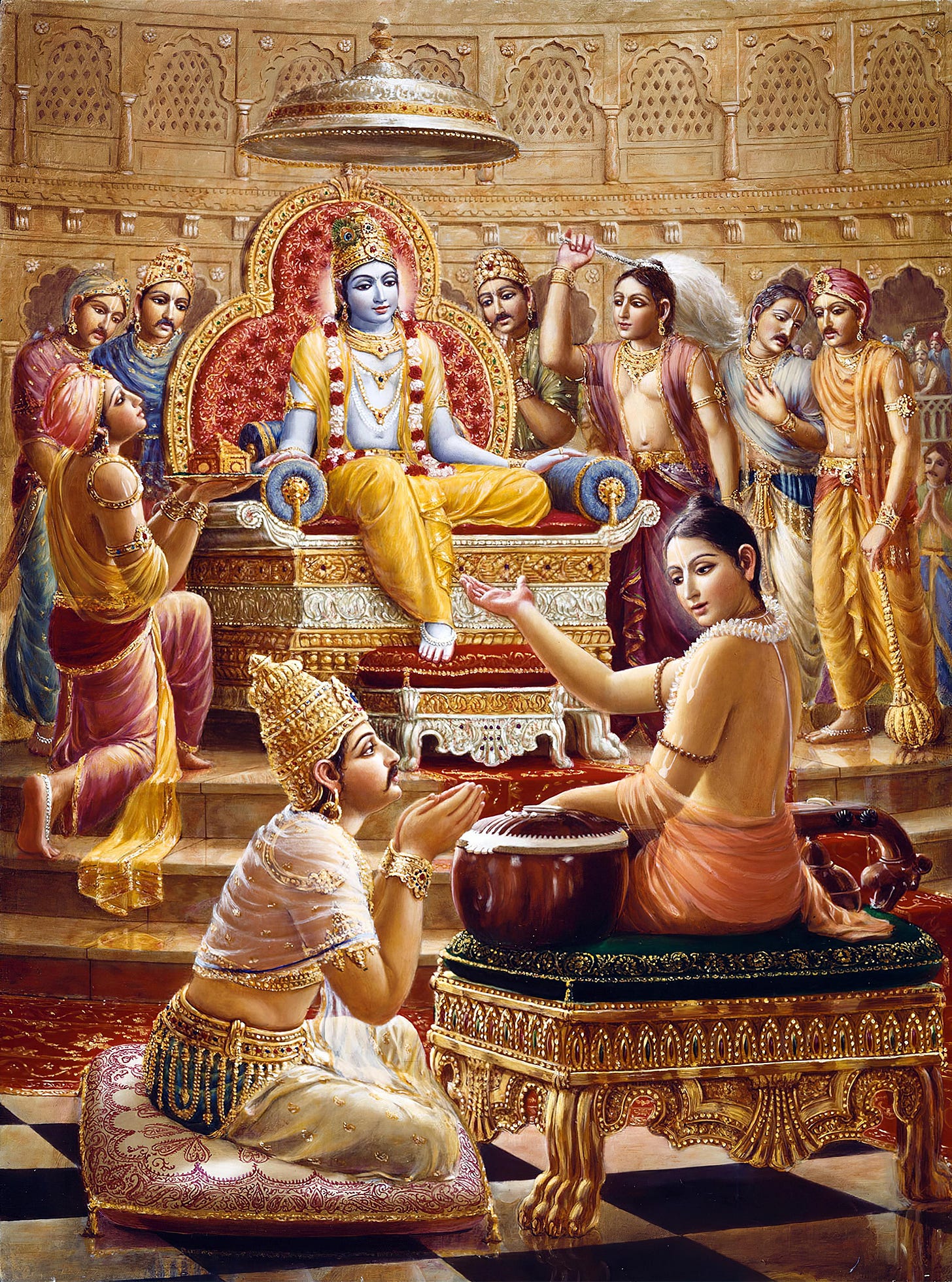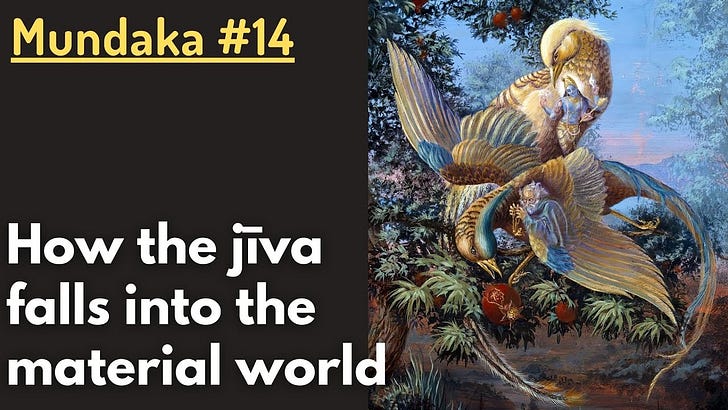The "fall of the jīva" is actually easy to understand. Prabhupada explains it repeatedly
Often, we study just fragments of Prabhupada's books, fixing our attention on isolated quotes instead of reading the books sequentially, like we are supposed to do.
Often, we study just fragments of Prabhupada's books, fixing our attention on isolated quotes instead of reading the books sequentially, like we are supposed to do. Sometimes we may also fall into the mistake of quickly reading many books from different sources without properly trying to properly understand their meaning. Śrīla Bhaktisiddhānta Sarasvatī Ṭhākura writes in his Anuvṛtti commentary to the Sri Upadesamrta that too much endeavor to acquire dry knowledge falls within the category of atyāhāra (collecting more than needed). Dry philosophical knowledge without proper realization is not of much value.
By doing so, we fall into many philosophical mistakes that are clearly explained by Srila Prabhupada in his purports. Just see what he mentions on 4.21.12, for example:
"Acyuta refers to one who does not fall because He is never influenced by the modes of material nature. When a living entity falls down to the material world from his original position, he becomes cyuta, which means that he forgets his relationship with Acyuta. Actually every living entity is a part and parcel, or a son, of the Supreme Personality of Godhead. When influenced by the modes of material nature, a living entity forgets this relationship and thinks in terms of different species of life; but when he again comes to his original consciousness, he does not observe such bodily designations."
This can be broken into simple ideas that will sound familiar to anyone who studies his books:
a) Krsna is called acyuta (infallible), because He does not fall and is never influenced by the modes of material nature.
b) The soul has an eternal relationship with Krsna, but when one falls from this original position, one is called cyuta (fallible).
c) Becoming cyuta or fallible means we forget our relationship with Acyuta.
d) In truth, every living entity is a part and parcel, or a son, of the Supreme Personality of Godhead, and thus eternally and intrinsically connected with Him.
e) However, when influenced by the modes of material nature, we forget this relationship and identify with different types of material bodies, acting sometimes as a human being, other times as an animal, etc.
f) This state of illusion, however, ends when we come again to our original consciousness.
These same basic ideas are echoed in so many of Prabhupada's purports. It's not just a few or a dozen, but hundreds or even thousands. Nowadays, we discuss a lot about whether the soul has or does not have an eternal relationship with Krsna, but when we study purports like these, it emerges that not only did Prabhupada leave us clear explanations in this regard, but he also repeated it all over his books.
The problem is that when we speak about having an eternal relationship with Krsna, we immediately think about having Prema, or pure love for Krsna. We then equate having a relationship with Krsna with being like the Gopis or mother Yaśodā. When we consider things from this point of view, of course, it doesn't make any sense that someone could leave this position to come down to this material world. Because we can't reconcile both ideas, we tend to reject the teachings of Srila Prabhupada and try to find some simpler explanation for how we could end up in this material world. We then frequently go all the way to the opposite idea that we never had any relationship with Krsna, which is equivocal.
Krsna has only two energies, the spiritual energy and the material energy. The soul is part of the spiritual energy, but because the soul has free will, and thus the freedom of choosing between the spiritual and material energies, it is considered Krsna's third potency: the marginal potency. It is important to remember, however, that this distinction is more technical, since for all practical effects the soul is part of the internal or spiritual potency.
This means that the soul comes from Krsna and thus has an intrinsic relationship with the Lord. The soul does not come from the material energy or from anywhere in between, although the soul may pass through the brahmajyoti, the causal ocean, and many places when it decides to come to the material world, just as someone who enters a country has to pass through the border. The border is not one's origin, but one passes there as part of one's trip.
This brings us back to the simple idea that Prabhupada insistsently repeats in his purports: the soul is eternally related to Krsna in a bond of love, and this eternal relationship can't ever be lost, although it can be temporarily forgotten when we choose to venture in this material world. Krsna doesn't send us here; we come here of our own will. Despite that, Krsna wants us back.
This knowledge is part of sambandha, the preliminary knowledge that one needs to properly practice devotional service. If it were not important, Prabhupada would not stress it hundreds of times in his purports.
If one thinks that he came from the impersonal brahmajyoti, he will consider that maybe the best is to just go back there, or if one thinks that he was always in this material world, he may conclude that he should just remain here. One who thinks that Krsna is ultimately the one who sent us here to the material world to suffer due to some whim will internally always keep a contradictory attitude toward Him, much like many Christians and Jews, who often follow their religions mainly out of fear of the wrath of God. Misconceptions about our relationship with Krsna can lead to insurmountable challenges in one's spiritual life, and one of the worst effects is when, due to such incorrect conclusions, one ends up rejecting the teachings of Srila Prabhupada.
The fact that we have an eternal relationship with Krsna doesn't mean we are like the Gopis of Mother Yaśodā, a point that Srila Bhaktivinoda Thākura emphasizes in his Jaiva Dharma. There are infinite possibilities for relationships with Krsna, most of which we don't properly understand. The fact that the soul is a forgotten servant of Krsna doesn't imply that we all previously had Krsna prema on the level of the Gopis and somehow lost it.
This brings us to another idea, which is hinted at in the works of Srila Bhaktivinoda Thākura: our love for Krsna can always increase, and there is no ultimate limit to the expansion of such love. Whatever the beginning of such love is, the fact is that there is no ultimate limit to it.
It's often said that we should not speculate about how we came to this material world, because this is ultimately impossible to comprehend in our conditioned state. The point however, is that this instruction refer to a very specific component of the question, which is to understand exactly why and when we decided to come here, and not to understanding our eternal relationship of service to Krsna, which repeated thousands of times by Srila Prabhupada in his books, and must be clear from the beginning. This is part of sambandha, and must be properly understood:
We are part of the internal potency of Krsna; we are eternally related to Him in a bond of love. Our eternal position is to always serve Krsna in some capacity, but at the same time, we have free will, and therefore, "somehow" we have come here. Now, our goal must be to return, or realize our original position of service to Krsna.
As you can see, almost everything is clear. The only part that we can't comprehend is the "somehow" part of how exactly we have come here. The problem starts when we become obsessed with this small part and lose track of the rest.
It's important, thus to understand that we all have an eternal relationship with Krsna, and whatever this original relationship is, this love can always be increased. This is precisely the great opportunity we have now as part of the saṅkīrtana movement of Lord Caitanya. We may not be able to understand how we made the choice of coming to this material world, but once we attain pure love for Krsna, such questions become irrelevant.
Srila Prabhupada repeatedly makes this point in his purports, explaining the philosophy in a simple and practical way. However, at times, it seems we have trouble accepting such simple conclusions and end up taking shelter in our minds.
Read also:
If you read this article to the end, give it a like. This helps it to reach more people.
If you have questions, use the comments; I will answer as possible. They may even become the topic for another article. Your thoughts and opinions are also very welcome. ⤵️






Wonderful article Prabhuji , so true , if we study SP books properly , our doubts will be cleared from such misconceptions.This post cleared up alot of doubts I had. Thank you , Hare Krishna